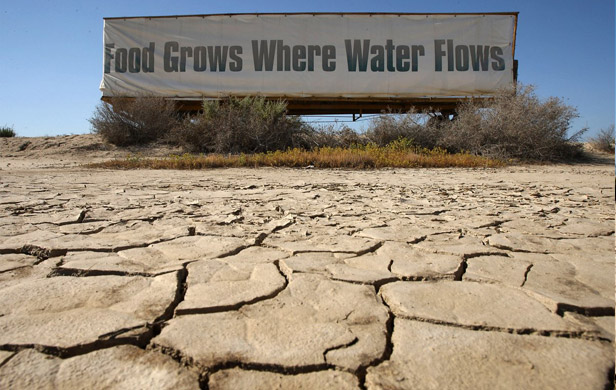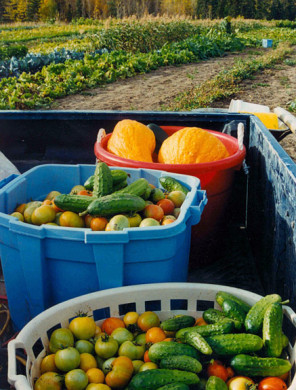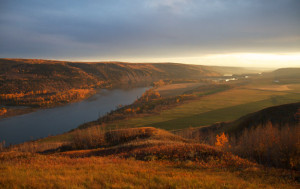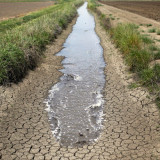
As British Columbians share a meal this weekend, giving thanks for the food with which we are so blessed, year-round, let us pause for a moment to consider where so much of it comes from: California.
Let us also say a prayer for the last truly productive tracts of local farmland we have left, now threatened by industrial development – first and foremost being the Peace River Valley, in northeast BC, where the proposed Site C Dam could wash away enough good agricultural terrain to feed a million people.
BC depends on food imports
The fact is BC now grows less than half of the food it consumes, and the places we depend on for our imports may not be able to continue providing them into the future. As Randy Shore pointed out in the Vancouver Sun this past Friday, a record drought in California may drive up food prices in BC by as much as 34% this year.
Shore was referring to a recent study commissioned by Vancity on BC’s food security. Says the study’s author, Brent Mansfield of the UBC faculty of land and food systems:
[quote]As the drought deepens in California and elsewhere, we need to understand what that means for consumers, for governments and for the business of agriculture here in B.C.[/quote]
With 67% of of our fruits and vegetables now being imported from the US – and half of that from California – BC is vulnerable to changing conditions amongst those suppliers. Thus a severe drought in California’s Central Valley means British Columbians should brace for paying 34% more for Californian lettuce and 22% more for broccoli, according to the University of Arizona and University of Guelph.
Then why flood our best farmland?

All this makes the notion of destroying local food production capacity seem downright crazy. Nowhere is this more evident than with the proposed Site C Dam, whose power is only necessary, we’re told by our government, to power the enormously energy-intensive, proposed LNG industry – or to free up excess power for export to…irony of ironies – California.
Site C – this $8 billion-plus, taxpayer-funded dam that would increase our provincial debt by more than 10% and won’t benefit the people or businesses of the province one iota – would cause the single largest loss of farmland in the history of the Agricultural Land Reserve. It would drown or disrupt over 30,000 acres of amazing farmland.
Of course, the Agricultural Land Commission – the public’s supposedly arm’s length watchdog whose job it is to review and often oppose such planned assaults on our food security – was barred by a meddling government from reviewing Site C.
Yet the Joint Review Panel investigating Site C Dam heard from some of the country’s top independent agrologists just how much damage the project would do, and what makes this land so valuable.
The secret of the Peace Valley’s amazing farmland

For starters, the Peace River’s largely east-west orientation means the valley gets more sun, thus experiencing longer growing days and seasons than other land that far north. “The best farmland in BC is in the southern valleys,” expert agrologist Evelyn Wolterson told the review panel. “The notable exception is the Peace River Valley.”
Other factors like lower wind speeds, excellent Spring moisture, and a longer frost-free period mean, counterintuitively, that “crop yield goes up as you go from the south to the north,” Wolterson explained.
[quote]These are all elements of this valley that make it absolutely unique…not only in the region but in all of British Columbia, and perhaps Western Canada.[/quote]
These factors, combined with high-grade alluvial soils mean the Peace Valley can rival and even exceed the Lower Mainland’s Fraser Valley breadbasket for productivity.
For instance, Larry Peterson, who ran a successful market garden in the Peace Valley with his wife Lynda in the 1970s and 80s, got 13.6 tonnes per acre for potatoes, compared with the average yield in the Lower Fraser Valley of only 10.2 tonnes per acre.
Hydro downplayed Valley’s value
The valley’s agricultural attributes have been “very dramatically” downplayed by project proponent BC Hydro, says Wendy Holm, a former president of the BC Association of Agrologists.
[quote]The land to be flooded by Site C is capable of producing high-yielding fresh fruits and vegetables for over a million people.[/quote]
Yet Hydro and the BC government act like Site C’s impact on farmland is small potatoes.
The reality is the large flood reserve Hydro has been accumulating for years – buying up farmland throughout the region and sitting on it in preparation for the dam – coupled with the spectre of the project that has loomed over the valley for over 3 decades now, have severely constrained local agricultural investment and development, creating a false picture of the region’s potential for food production.
So this Thanksgiving, as we pass the Brussels sprouts that are actually from California, let us take a moment to reflect on the value of healthy, local food production. And then, after the turkey-induced haze has worn off, tell the Harper Cabinet – in advance of its anticipated Oct. 22 ruling on Site C – that flooding our best remaining farmland for energy we don’t need just plain doesn’t make sense.


I’m just a dirt poor farmer who had to move to Alberta to do some farming. I would love to farm in the Peace river valley, but the truth is, I can’t afford to buy land in the province where I was born. This truly sucks.
The thought that it might not be there before I can afford to buy land just makes me wonder what those in charge are thinking. Maybe they should try farming for a while to see what it’s like on the front lines before they decide to flood someones potential bread and butter!
I agree that building a dam at site C will destroy a lot of very valuable farmland. There are always trade off’s between power production and land consumption for any hydro dam. How do we generate power otherwise? Burn coal, Oil, natural gas, nuclear? Not very pleasing alternatives.
Secondly, the vast majority of farmland in this province is not used at all or used for grazing in spite of it’s highly productive nature. Scan through the statistics or use your own observations. In BC, most of the imported foods either don’t grow here at all, like citrus or tropical fruits like bananas or is imported during seasons we can’t grow them. Lettuce, celery, broccoli, and other soft vegetables cannot be stored for winter like potatoes, turnips or apples can. During our fresh market season, our local production supplies almost 100% of our needs for those crops. Apples, cranberries and hot house tomatoes are even exported to the United States.
When I conducted a study for the BC Ministry of Agriculture in the 1980’s only 25000 hectares of land was being used for horticultural crops which included corn silage for dairy and beef animals. This was out of 2.5 million hectares of class one to three land in the ALR in the province. That doesn’t include almost 3 times as much class one to three land under the aegis of the Ministry of Forests.
The biggest impediment to the production of vegetables, cheese, fruits and poultry here is the regulatory environment. Agricultural Marketing boards exist to limit production of certain agricultural commodities by restricting the number of producers and production to keep prices high to existing farmers. This is the major reason why so much farmland is unused.
While I agree that a lot of farmland will be lost to the site C project, it is wrong to suggest that this will have ANY impact on agricultural products available to consumers in this province. Too many other factors restrict production, most notably lack of local demand and restrictions on production that have nothing to do with land availability.
Peter, first of all, you’d be surprised what can be grown in the Peace River Valley – and the length of the growing seasons.
Second, you’re falling into the classic misconception about our energy needs. Site C is not for BC’s homes or businesses, as I’ve been reiterating in these pages for years. This is acknowledged by our government and by Hydro:
https://commonsensecanadian.ca/site-c-dam-story-changes-now-powering-california/
Even the Joint Review Panel found the need for the project had not been established.
So it’s a false dichotomy to suggest this is a choice between a large hydro dam (which is far less “green” or climate friendly than portrayed) and gas or coal.
https://commonsensecanadian.ca/REPORTED_ELSEWHERE-detail/large-hydro-dams-arent-green-actually-drive-climate-change/
This argument disintegrates if we don’t need the power now or into the future – which we don’t.
Not to mention the fact it would impose and extraordinary, unnecessary burden on taxpayers and ratepayers:
https://commonsensecanadian.ca/ex-td-bank-comptroller-site-c-dam-costly-unnecessary-rushed/
The only argument in favour of the dam from the feds in their approval – that it’s “justified in the circumstances” due to the alleged positive economic impacts of the project – is a bogus one.
https://commonsensecanadian.ca/REPORTED_ELSEWHERE-detail/harper-govt-joins-bc-backing-site-c-despite-significant-adverse-environmental-effects/
What a debacle.
Please read Chapter 7, “To Give a Dam” by Marq deVilliers in his 1999 Governor General’s award book WATER: The fate of our most precious resource. He explains the financial and environmental folly of most dam construction – plus the 1997 World Commission on Dams.
Ok first off I’m willing to bet Damien gillis has never visited the peace river valley, just surfed a bunch of articles relating to this area. If he did he would see folly of his article. This so called river valley has a 4-5 month growing season. Good for hay only, and that’s all that is grown here,the so called rich soil is sparse. Remember folks these anti Canadians don’t want us(bc.hydro)remember it’s owned by us taxpayers,to be able to export our own power, instead they want us dependant on foreign owned. Wind and solar project ,and be held at there pricing agreements
I don’t think your assessment is very well done Joe. The Peace River valley farmlands grow pumpkins, melons, sweet corn, berries and tree fruits and grapes. It grows potatoes, peas, and beets, and has been doing so for generations. As a farmer on the banks of the Peace for fifty years I understand the value of that land to the future.
Your other assertion concerning the loyalty of people who are suggesting we develop less harmful energy options is just silly.
You’re more than a little wrong, Joe. My family settled in the Peace Valley over a hundred years ago and lost our ranch to the first big dam, WAC Bennett. I have visited the valley on many occasions and know it well. You’re wrong about the growing seasons, which are longer than most in the province. The alluvial soils are also excellent. So basically, you’re wrong about everything, leaving me to wonder if you’ve ever visited the valley, let alone what business you have lecturing me or anyone else about its lack of agricultural potential.
On the subject of our public Hydro utility, the issue here is the fact that we will lose some $350 million a year exporting power to California:
https://commonsensecanadian.ca/VIDEO-detail/fundamentally-uneconomic-site-c-dam-lose-350-million-year-taxpayers-industrial-energy-expert/
At one time, yes, the taxpayers of BC did own BC Hydro, a profitable operation that also provided reasonably priced electricity, but that is no longer true.
What we in fact DO own now is a huge debt, brought to you and I by a wonderful gift called Independent Power Producers (also known as very best friends of former disgraced premier, Gordon Campbell).
And then there’s the NERC factor.
The North American Energy Regulatory Committee. A private American corporation.
Some faceless entity at Hydro, or the Liberal Government gave them control over our publicly owned energy resource.
This control is backed up by millions in fines if this, or a subsequent government doesn’t go along with NERC commands.
I believe NERC might also have been a driving force behind Campbell’s so-called smart meter rollout. But details are scarce.
I’ve submitted an FOI to Hydro for the names of Hydro and other officials involved in this betrayal of the public trust. They have not acknowledged this FOI request.
Indeed, Mooney:
https://commonsensecanadian.ca/nerc-reliability-bc-hydro-private-power-run-of-river-ipp-erik-andersen/
This would be another nail in the coffin for Canada. We need decision-makers in office who prioritize both short- and long-term goals, including environmental health, food production, clean water, and clean air. We need a healthy environment to provide food, water, and oxygen for our growing population. Destroying the land, air, and water that supports us is incredibly short-sighted and counter-productive. It will weaken our people, our country, and our economy. Politicians: please wake up and act responsibly! Canadians: please vote, sign petitions, and write emails. Let’s all help keep our environment healthy! (Buy local, support farmers markets, recycle, ease off on energy use, support small businesses, avoid big box stores, try Craigslist and charity shops to find items you need, donate unused items to charity shops, give away items you aren’t using, throw a yard sale, throw a clothing swap party, grow some food in your garden or balcony pots, try solar-powered items, ride your bike, etc.)
That is a good analysis by Damien Gillis of the way the farmland in the Peace Valley is being considered, or worse, not considered. The terms under which Hydro was supposed to provide evidence for the hearing, and which Hydro helped to draw up, specified an examination of the potential value to society of the agricultural capability. Hydros report consistently undermined that goal and in the end tried to pass over the land as being virtually useless. And they have been singing the same dirge since the early 1970’s. You don’t expect anything different from a bunch of hydro-electric engineers who want to build a dam, but the Hearing panel, the people who were to provide advice to government based on those terms also refused to acknowledge the potential value of the valley.
This government is looking desperately for some big project to inject money into the economy to keep it growing. Needless to say that debt and interest payments on such a huge borrowing would detract from growth. Our huge debt is a good part of the problem we are in the straits we are in now. Or that growth itself isn’t a worthy long term goal.
One of the things that was picked up on in the Hearings is that there is low cost, and appropriate alternatives to provide energy when and where needed. One can always hope that governments will see that light.
The descision is handed down Oct 22?
Geez I’m surprised the Harper Govt isnt doing this behind closed doors on the Thanksgiving weekend………
That’s what we’re hearing…Though you’re right – that would by a typical move for this government:
https://commonsensecanadian.ca/canadians-get-lots-coal-oil-gas-holiday-trash-dump/
Excellent article! When we look at this issue in a broader manner, like why is California drying up and how! http://www.geoengineeringwatch.org/ Then look at some political history of feeding California and the central US States with Canadian Water, http://www.waterwarcrimes.com/, then follow the money and current Political world atmosphere, http://hassanalkatib.wordpress.com/2014/10/12/new-horizon-conference-exposes-zionist-lies/, we begin to see the larger world picture. And of course they did give away 40% of our WATER for profit! http://shelleyannclark.wordpress.com/
Wow, that link to watercrimes was a stunner .
Here’s another piece to the puzzle.
http://lailayuile.com/2011/07/28/why-did-the-bc-government-repeal-the-weather-modification-act/